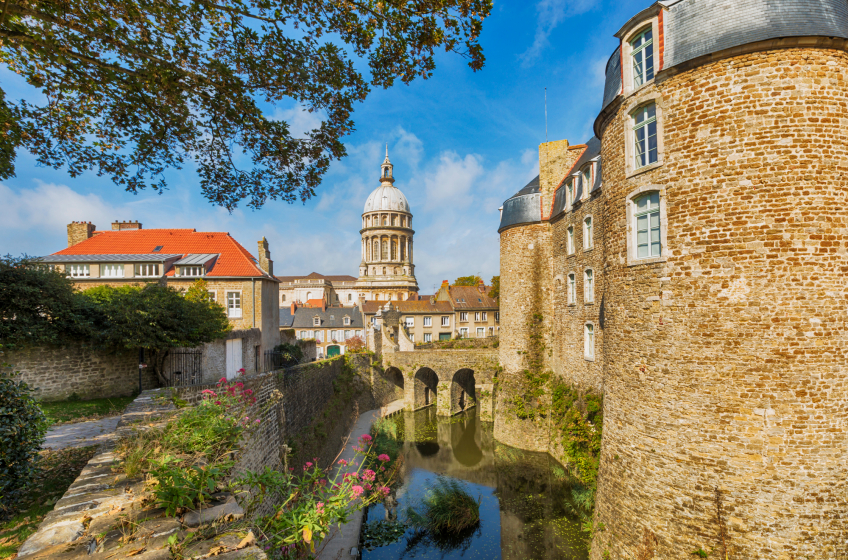Discover Boulogne-sur-Mer | A Visitor's Introduction to Boulogne
Boulogne-sur-Mer, a charming coastal city, is a hidden gem brimming with history, culture, and seaside beauty. This picturesque port city offers a delightful mix of historical landmarks, vibrant marine life, and a lively cultural scene.
Recommended Boulogne-sur-Mer Accommodation: Hotels Bed & Breakfasts
Historical Significance
Boulogne-sur-Mer boasts a rich history that dates back to Roman times. The Old Town (Haute Ville) is a testament to its storied past, featuring well-preserved medieval architecture and winding cobblestone streets. At its heart stands the Château-Musée, a 13th-century castle that now houses a museum with diverse collections, including Egyptian antiquities, medieval artifacts, and local art. The castle’s ramparts offer stunning views of the city and the English Channel.
Another must-visit landmark is the Basilique Notre-Dame, an impressive 19th-century basilica with a striking dome that dominates the skyline. Beneath the basilica, the Crypt is one of the largest in France and contains fascinating historical exhibits and ancient relics.
Nausicaá: National Sea Centre
One of Boulogne-sur-Mer’s top attractions is Nausicaá, the largest public aquarium in Europe. This state-of-the-art sea centre offers an immersive experience with a variety of marine life exhibits, from tropical fish and sharks to sea lions and penguins. The “Voyage on the High Seas” exhibit features a gigantic tank that simulates the open ocean, providing an awe-inspiring view of marine ecosystems. Nausicaá is not just an aquarium; it’s also a centre for marine conservation and education, making it a perfect destination for families and marine enthusiasts.
Cultural Attractions
Boulogne-sur-Mer’s cultural scene is vibrant and diverse. The Maison de la Beurière offers a glimpse into the lives of local fishermen and their families, showcasing traditional homes and fishing equipment. For art lovers, the Librairie des Enfants is a charming bookstore and cultural space that frequently hosts art exhibitions, readings, and workshops.
The city’s vibrant market scene is another highlight. The Place Dalton hosts a bustling market three times a week, where you can find fresh local produce, cheeses, seafood, and artisanal products. It’s an excellent spot to experience the local flavor and atmosphere.
Beaches and Outdoor Activities
Boulogne-sur-Mer’s coastal location makes it an ideal destination for beach lovers and outdoor enthusiasts. The city’s main beach, Plage de Boulogne, is perfect for a relaxing day by the sea, offering wide sandy shores, beachside cafes, and playgrounds for children. Water sports such as windsurfing, sailing, and kayaking are popular activities.
For hiking and nature walks, the Opal Coast offers breathtaking landscapes with its rugged cliffs, sandy dunes, and panoramic sea views. The nearby Cap Gris-Nez and Cap Blanc-Nez are particularly popular spots for their scenic beauty and bird-watching opportunities.
Shopping and Dining
Boulogne-sur-Mer offers a delightful shopping experience, with a mix of traditional markets, boutique shops, and modern stores. The Rue Thiers and Rue de Lille are popular shopping streets where you can find everything from fashion to local crafts.
The city’s culinary scene is a treat for food lovers. Being a coastal city, seafood is a highlight, with local specialties such as moules-frites (mussels and fries), bouillabaisse (fish stew), and freshly caught fish. La Matelote and Le Chatillon are renowned seafood restaurants offering delicious dishes with stunning sea views. For a more casual experience, visit one of the many bistros and cafes along the harbour.
Practical Tips
Boulogne-sur-Mer is easily accessible by train, with regular services from Paris and Lille. The city is also well-connected by road, and the nearby Calais ferry port offers connections to the UK. Once in the city, the compact city centre and efficient public transportation make it easy to explore the attractions on foot or by bus.
Parking is available, but it’s recommended to use public transport or walk, especially in the busy Old Town area. English is widely understood in tourist areas, but learning a few basic French phrases can enhance your experience.
Shortlist
- Your Shortlist is empty

